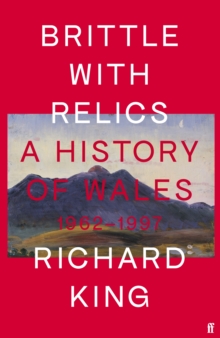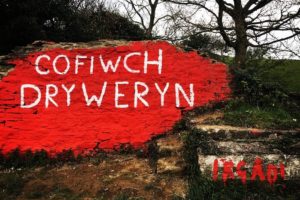Book Review – August 2023
This is a history of a nation determined to survive during crisis, while maintaining the enduring hope that Wales will one day thrive on its own terms.

I was looking forward to reading Brittle With Relics because the period of Welsh history that Richard King covers is one that has long fascinated me and, having previously read two of his books about music, I knew he was a very capable researcher and writer. It was also recommended to me by Liz Dexter, a friend of this blog, who was involved in the book’s production. But, I must admit, when I first received my copy, I had my doubts. The central concept of this book is a series of vignettes, arranged thematically, taken from almost a hundered interviews he conducted. Was this just a cheap cut-and-paste job, I found myself wondering. I needn’t have worried: Brittle With Relics is, perhaps, the best ever portrait of Wales in the late twentieth century. This is oral history at its most incisive and revealing. Some of King’s interviewees are household names: Neil Kinnock, Peter Hain, Dafydd Iwan and Leanne Wood, for instance. Others are less well-known but are nonethelees important to the strands of the story that King weaves together. Activists, and in particular women, from the Welsh language campaign, miners’ support groups, the second homes campaign and CND are given great prominence.
The final two decades of the twentieth century witnessed several crucial steps in Wales’s journey towards re-asserting its national identity and for the Welsh to recover their self confidence as a people. This process resulted in the creation of a Welsh National Assembly and Assembly Government in 1999, which later evolved into the nation’s Senedd and Welsh Government. Prior to this, the Welsh Language Act of 1993 put Welsh on an equal footing with English for the first time and , incrementally, began to reverse the decline of the Welsh language. The establishment of a Welsh language television channel, S4C, had already brought Welsh into the daily discourse of both native speakers and learners from 1982 onwards.
But prior to all of this, the 1960s, 70s and 80s were a grim time for Wales. King bookends the 60s with two tragedies : the flooding of the Tryweryn Valley in North Wales to provide water for Liverpool and the destruction of a primary school in Aberfan by the collapse of an unwisely placed coal tip. Tryweryn is still notorious for the arrogance of Westminster in insisting the Welsh-speaking community of Capel Celyn should be flooded, despite the opposition of 125 Welsh local authorities and 27 of Wales’s 36 MPs. In Aberfan 144 people were killed, including 116 children at Pantglas Junior School, when a spoil heap slipped down a hillside and engulfed the school. Local people and the National Union of Mineworkers had warned the National Coal Board about the danger of Tip Number 7 and the fact it was built on a stream, but they were ignored.

This period also saw the winding down and removal of heavy industry in Wales. Jobs in coal, steel, quarrying and manufacturing all disappeared. But this was not just about the loss of jobs, it was about communities; vibrant, confident and self-reliant communities were destroyed:
I’ve really got to blame Thatcher for all of this, because how did a town like Maerdy, a hard-working heavy industry place, turn into a hard drugs kind of community almost overnight? (Dewi ‘Mav’ Bowen)
The thread that runs through the entire period covered by Richard King’s book is Cymraeg, the Welsh language. Yet, committed as he is to the future of Cymraeg, King chose to write his book in English. This, I would suggest, allows him to include Anglophone Welsh voices within the text and to reach out to non-Welsh speakers within Wales and beyond. Thus, he is able to create a sense of Welshness that is uncompromisingly inclusive but undeniably Welsh. My own extended family, or at least those of us living in Wales, enjoy a mixed English, Polish and African-Caribbean heritage. Yet we are all proudly Welsh. This, I would contend, is indicative of a new Welsh indentity, an inclusive one; a national identity for the twenty-first century. It is, I suspect, an identity of which Richard King would wholeheartedly approve.
We saw ourselves emulating the civil rights movement in America. One of my first poems in my first book, Mwyara (Blackberrying), was about George Jackson, about the Black Panthers, Angela Davis. These were on my radar as much as Tryweryn and Cymdeithas yr Iaith. (Menna Elfyn)
The long history of the campaign for language equality in Wales started in 1962 with the founding of Cymdeithas yr Iaith, the Welsh Language Society. Taking inspiration from the civil rights movement in the United States, Cymdeithas yr Iaith launched and sustained a long campaign of non-violent direct action demanding that Welsh be accepted on an equal footing to English. Their targets were always property, such as road signs, and not people and the activists always made a point of taking responsibility for their actions, often waiting to surrrender themselves to the police. As a result, hundreds of Welsh language campaigners served time in prison during the 1960s and 1970s.
The Miners’s Strike of 1984-85 was a watershed in the dismantling of heavy industry in Wales and, as a direct result, the destruction of the communities these industries supported. The Thatcher government, King argues, picked a fight with the express aim of destroying the power of the NUM. The mining villages destroyed in Wales and elsewhere were no more than calculated collateral damage.
There were families that were practically living under martial law and people think you’re exaggerating now, because they couldn’t imagine it. (Christine Powell)
King highlights how the miners’ strike brought together a variety of campaigners from across Wales – language campaigners, peace activists, LGBT groups, musicians and artists, But central to this movement, he makes clear, were women.
This is the point where the interest in the miners started to change and this is the point where the union had to change its attitude to the women, because now people were realising what was keeping the strike going was the women. (Siân James)
What I really love about this book is that, within its 500 pages, Richard King gives due regard to the importance of popular culture, and in particular music. For many of us the music we discover in our teens and which forms us in our later years is an important part of our identity. King doesn’t just consider the more high-profile Welsh bands, such as Manic Street Preachers, Gorky’s Zygotic Mynci and Super Furry Animals, but he features other less successful but, he argues, just as influential artists like Datblygu and Y Cyrff.
Throughout the eighties and that period of Datblygu, Y Cyrff, Fflaps and Anhrefn recording Peel sessions, we all felt strongly that it was important that we sang in Welsh on those sessions. (Rhys Mwyn)
But, notwithstanding the decline and disasters of the period of the 1960s through to the 1990s that Brittle With Relics portrays, this is ultimately an uplifting book. Despite the narrow referendum victory for devolution in 1997, support for the Senedd is now solid throughout Wales, as indicated by the overwhelming 2011 vote on increasing the Welsh Government’s powers. And according to the language app, Duolingo, Welsh is the fastest growing language in the UK. (Full disclosure here – I’m a Welsh learner with Duolingo myself!) Interest in independence for Wales is growing. But, to know where we’re going, we need to know where we’ve come from. Which is why Richard King’s book is such a valuable contribution to this debate.
Richard King
 Richard King is the author of Original Rockers (shortlisted for the Gordon Burn Prize and a Rough Trade, The Times and Uncut Book of the Year), How Soon Is Now? (the Sunday Times Music Book of the Year) and The Lark Ascending (a Rough Trade, Mojo and Evening Standard Book of the Year, shortlisted for the Penderyn Prize). He was born into a bilingual family in South Wales and for the last twenty years has lived in the rural county of Powys, in mid-Wales.
Richard King is the author of Original Rockers (shortlisted for the Gordon Burn Prize and a Rough Trade, The Times and Uncut Book of the Year), How Soon Is Now? (the Sunday Times Music Book of the Year) and The Lark Ascending (a Rough Trade, Mojo and Evening Standard Book of the Year, shortlisted for the Penderyn Prize). He was born into a bilingual family in South Wales and for the last twenty years has lived in the rural county of Powys, in mid-Wales.
Brittle With Relics: A History Of Wales, 1962 – 1997
Richard King
Faber & Faber
Fewbruary 2022
UK – £21.00 (hardback), £12.99 (paperback)

Thanks for this review. I was very excited to read about this book when it came out…and then largely forgot about so I’ve ordered myself a copy. Despite being English, and not being a Welsh speaker, I’ve spent some of my best years living in Wales and adore a lot of Welsh rock music, especially Datblygu and Gorkys (and the awesome Welsh Rare Beat compilations). It’s always felt like home when I’ve lived there, and in many ways still does. Can’t wait to read the book.
Thanks David. It’s probably me showing my age but I think we’ve slipped back from the heights of the Welsh music scene in the 80s and 90s. But judging by events like Focus Wales, there are lots of new young Welsh artists beginning to emerge. Hope you enjoy the book.
I’m so glad you got such a lot out of this book, he weaves the interviews together so beautifully, doesn’t he. It was also quite an emotional read for me – I cried reading the description of the return to the pits after the strike, with the brass band playing, even though I knew it was coming and I, the interviewee and Richard all got emotional during the interview / its transcription! I was also immensely proud to see all my work there almost as was, as I hadn’t realised at the start it would be so fully an oral history. I think it’s the best book he’s done and yes, loved all the music side, too.
I think it’s a book to be immensely proud of, Liz. No doubt it will be referenced by other writers for many years to come.